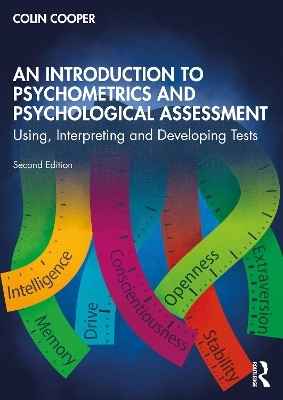
An Introduction to Psychometrics and Psychological Assessment
Routledge (Verlag)
978-1-032-14617-1 (ISBN)
An Introduction to Psychometrics and Psychological Assessment is the successor to Cooper’s prize-winning book Psychological Testing: Theory and Practice. This expanded and updated volume shows how psychological questionnaires and tests can be chosen, administered, scored, interpreted and developed. In providing students, researchers, test users, test developers and practitioners in the social sciences, education and health with an evaluative guide to choosing, using, interpreting and developing tests, it provides readers a thorough grasp of the principles (and limitations) of testing, together with the necessary methodological detail.
This book has three distinctive features. First, it stresses the basic logic of psychological assessment without getting bogged down with mathematics; the spreadsheet simulations and utilities which are integrated into the text allow users to explore how numbers behave, rather than reading equations. Readers will "learn by doing". Second, it covers both the theory behind psychological assessment and the practicalities of locating, designing and using tests and interpreting their scores. Finally, it is evaluative. Rather than just describing concepts such as test reliability or adaptive testing, it stresses the underlying principles, merits and drawbacks of each approach to assessment, and methods of developing and evaluating questionnaires and tests. Unusually for an introductory text, it includes coverage of several cutting-edge techniques, and this new edition expands the discussion on measurement invariance, methods of detecting/quantifying bias and hierarchical factor models, and features added sections on:
Best practices for translation of tests into other languages and problems of cultural bias
Automatic item generation
The advantages, drawbacks and practicalities of internet-based testing
Generalizability theory
Network analysis
Dangerous assumptions made when scoring tests
The accuracy of tests used for assessing individuals
The two-way relationship between psychometrics and psychological theory
Aimed at non-mathematicians, this friendly and engaging text will help you to understand the fundamental principles of psychometrics that underpin the measurement of any human characteristic using any psychological test. Written by a leading figure in the field and accompanied by additional resources, including a set of spreadsheets which use simulated data and other techniques to illustrate important issues, this is an essential introduction for all students of psychology and related disciplines. It assumes very little statistical background and is written for students studying psychological assessment or psychometrics, and for researchers and practitioners who use questionnaires and tests to measure personality, cognitive abilities, educational attainment, mood or motivation.
A proud Cornishman, Colin Cooper obtained his BSc and PhD degrees in psychology from the University of Exeter in the UK. He worked on developing methods for selecting pilots and for assessing flexible thinking in senior officers before taking a lectureship at the University of Ulster in Coleraine, Northern Ireland. He moved to Queen's University, Belfast, where he taught and researched individual differences, psychometrics and statistics for 20 years. He took early retirement in 2012 and emigrated to Ontario, Canada, where he is currently editor-in-chief of two journals and president of the International Society for the Study of Individual Differences. He has published extensively in the areas of individual differences and psychometrics, and in his spare time enjoys classical music, writing, travel and walking.
Preface
Chapter 1: Introduction to Psychometrics
Chapter 2: Tests, Scales and Testing
Chapter 3: The meaning of measurement
Chapter 4: Administering and scoring Questionnaires and Tests
Chapter 5: Interpreting Scores
Chapter 6: Correlations
Chapter 7: Random errors of measurement
Chapter 8: Systematic Influences and Generalisability Theory
Chapter 9: Test Validity, Bias and Invariance
Chapter 10: Introduction to factor analysis
Chapter 11: Performing and interpreting factor analyses
Chapter 12: Alternative factor analysis designs
Chapter 13: Developments in Factor Analysis
Chapter 14: Network Analysis
Chapter 15: Item response theory
Chapter 16: Test and scale construction
Chapter 17: Problems with test scores
Chapter 18: Psychometrics in context
References
Index
| Erscheinungsdatum | 20.04.2023 |
|---|---|
| Zusatzinfo | 47 Tables, color; 44 Line drawings, color; 44 Illustrations, black and white |
| Verlagsort | London |
| Sprache | englisch |
| Maße | 174 x 246 mm |
| Gewicht | 852 g |
| Themenwelt | Geisteswissenschaften ► Psychologie ► Allgemeine Psychologie |
| Geisteswissenschaften ► Psychologie ► Test in der Psychologie | |
| Geisteswissenschaften ► Psychologie ► Verhaltenstherapie | |
| ISBN-10 | 1-032-14617-6 / 1032146176 |
| ISBN-13 | 978-1-032-14617-1 / 9781032146171 |
| Zustand | Neuware |
| Informationen gemäß Produktsicherheitsverordnung (GPSR) | |
| Haben Sie eine Frage zum Produkt? |
aus dem Bereich


